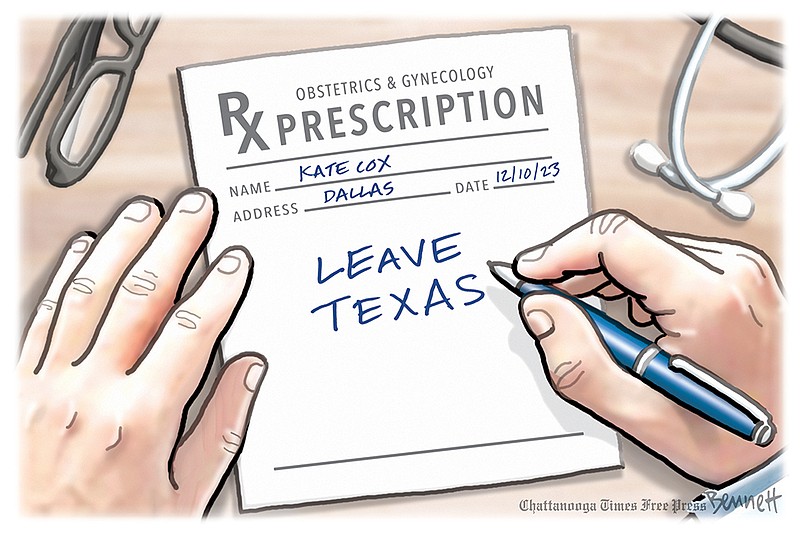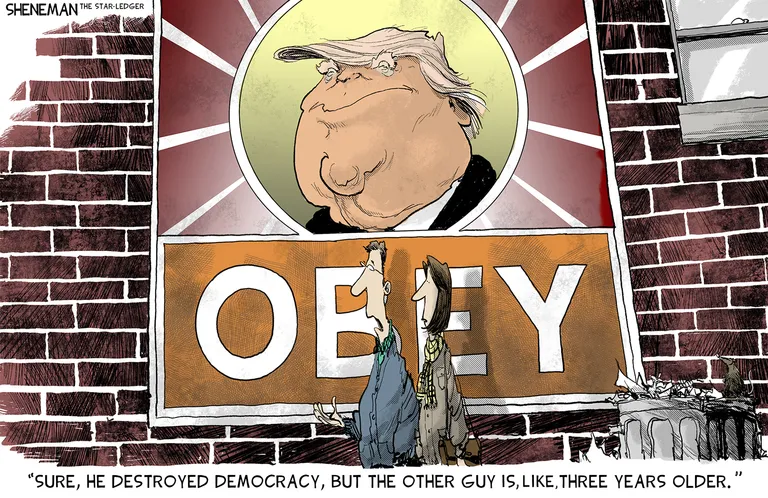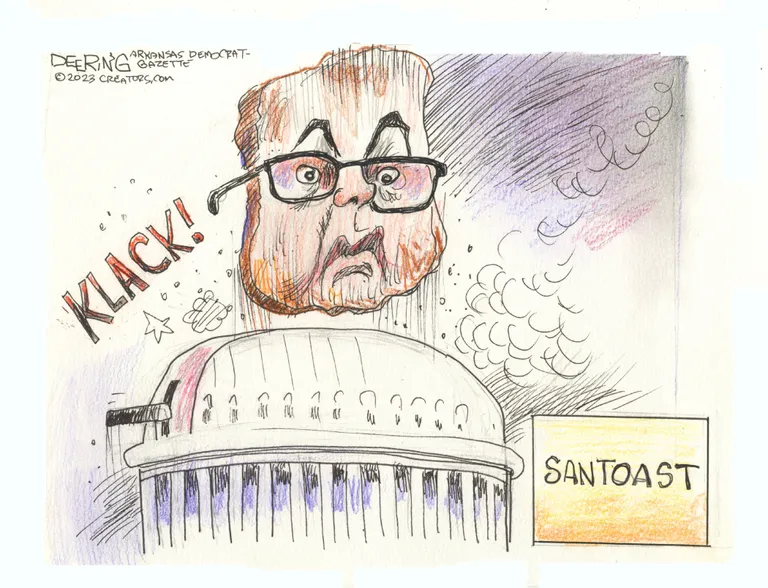No Sift articles will appear on Christmas or New Years.
So the next new articles will post on January 8.
This is an opportunity that my Republican colleagues denied us in 2017, when committee Democrats called for a hearing six years ago on campus discrimination, when white supremacists marched through the University of Virginia grounds shouting “Jews will not replace us.” We didn’t — couldn’t get a hearing back then.
- Rep. Donald Norcross (D-NJ)
at the "Holding Campus Leaders Accountable and Confront Antisemitism" hearing
This week's featured post is "Those University Presidents".
This week everybody was talking about university presidents
That's discussed in the featured post. At the risk of appearing to be soft on genocide, I take the presidents' side over Elise Stefanik's.
and COP28

Pretty much across the board, the story of the world's response to climate change is simple: We're doing the right things, we're just not doing them fast enough. The COP28 agreement is more of that trend. So you can spin it positively (it represents progress over all previous international anti-climate-change agreements) or negatively (nations don't commit themselves to the kind of transformation we really need).
The text of the agreement “calls on” countries to “contribute” to global efforts to reduce carbon pollution. It lists a menu of actions they can take, including “transitioning away from fossil fuels in energy systems … accelerating action in this critical decade, so as to achieve net zero by 2050.”
What the agreement doesn’t do is require a “phase-out” of fossil fuels. That ambitious language was supported by more than 100 countries, including the United States and European Union, but was fiercely opposed by fossil fuel states such as Saudi Arabia.
The agreement also calls for a tripling of renewable energy capacity and a doubling of energy efficiency, both by 2030.
Of course, none of that constitutes binding commitments.
Fundamentally, the problem is that governments are not going to get too far ahead of their people, and people's willingness to sacrifice to stop climate change is not increasing as fast as it needs to. We can see that happening right here: If Biden imposes too much sacrifice on the American people, he'll lose the 2024 election. And then Trump won't just stop future progress, he'll undo the things Biden has managed to get done.
The best we can realistically hope for is that governments won't be too far behind their people, which can easily happen when special interests have too much influence.
and Rudy
If you watched the January 6 Committee hearings in the summer of 2022, you have to remember Shaye Moss and Ruby Freeman, the daughter/mother pair of Georgia election workers who were hounded by MAGA yahoos after Rudy Giuliani (and others) made up a lot of nonsense about them stealing massive numbers of votes from Donald Trump, who otherwise would have won Georgia.
How they supposedly accomplished that feat was never precisely spelled out. Maybe they had suitcases of fake ballots, or maybe they did something with a USB drive and those crooked Dominion Voting Systems machines (the ones Fox paid $787 million for lying about).

What isn't in dispute is that their lives were turned upside down. They got death threats, people came to their homes, and (in one particularly disturbing video) Trevian Kutti pressured Moss to "confess to Trump’s voter-fraud allegations, or people would come to her home in 48 hours, and she’d go to jail."
Well, Friday a jury ruled that Rudy owes Moss and Freeman $148 million for defamation, emotional distress, and punitive damages. Of course, Rudy doesn't have $148 million, but now he's going to have nothing, probably for the rest of his life. Fortunately for Rudy, he won't go homeless, because the State of Georgia is offering him room and board for many years to come.
Sadly, this verdict means that Rudy won't have the money to pay Noelle Dunphy, who probably will also win a million-dollar settlement.
Giuliani's refusal to participate in the judicial process or testify in his own defense is the latest example of a pattern in Big Lie trials: In the media, MAGA folks talk big about the evidence they have and the claims they can prove. (Rudy is still making such claims.) But when it's time to provide solid evidence in court, they offer nothing. That was the story in nearly all of the 60 cases Trump lost after the 2020 election. That's what happened in the Fox/Dominion defamation trial. Fox could have saved itself 3/4 of a billion by making a plausible case that Dominion's machines actually were faulty, but they decided not to.
Just for a moment, I'm going to put aside any sense of journalistic responsibility and approach this situation as a fiction writer: If Rudy were a character in a novel, he'd be found dead in a hotel room in a month or two. We'd all be left to wonder if he had committed suicide, or if he just miscalculated how many sleeping pills or pain killers you can take with that much alcohol. And a few conspiracy theorists would say he had been murdered.
I'm not predicting that or wishing it. I'm just saying that's the story arc he's on. Story arcs are not fate, but they can develop momentum.
and Kate Cox

Kate Cox is a married mother of two who wanted to have another baby. She got pregnant, decided not to have an abortion, and looked forward to her due date. But then something went wrong.
The amniocentesis confirmed her fetus was developing with full trisomy 18, an extreme chromosomal abnormality. If her child was born alive at all, they would survive only minutes, hours or days outside of the womb.
The bad news was not just for her fetus, but for her as well: She was making multiple trips to the emergency room, and doctors told her that delivering this baby could affect ability to have children in the future. All things considered, she wanted to have an abortion.
“I do not want to put my body through the risks of continuing this pregnancy,” she said. “I do not want to continue until my baby dies in my belly or I have to deliver a stillborn baby or one where life will be measured in hours or days.”
But there was another problem: Her family lives in Texas, which has outlawed nearly all abortions. When the law was being debated, its proponents said not to worry, because it contained exceptions.
Texas’ laws have narrow exceptions only to save the life or prevent “substantial impairment of major bodily function” of a pregnant patient.
Those exceptions have two problems: (1) They're vague. (2) A doctor who interprets those exceptions too loosely might face severe consequences.
The penalties for abortion providers who violate the state’s law include a decades-long prison sentence, a $100,000 fine and the loss of a medical license. When one misinterpretation of the law could mean the loss of your vocation and freedom, it’s no wonder that the legislation has had a chilling effect on doctors in the state providing any abortions at all.
So Kate's doctors wouldn't proceed without a court declaration that her abortion was legal. (Picture the situation: You're in and out of the ER with a difficult pregnancy, you're dealing with tragic news, and you need to scramble to find a lawyer and go to court.) Fortunately, a court agreed with her.
OK, then, you might think; the law is cumbersome, but it works. But then Texas Attorney General Ken Paxton stepped in, asking the Texas Supreme Court to countermand the lower court's decision -- which it did.
The end result was that Kate had to leave the state to get treatment in a strange city from doctors she didn't know. Her lawyers won't announce where she went, but they say that she got the abortion and she's doing fine.
A few observations:
- Her story has a not-as-bad-as-it-could-have-been ending because she has means. A less well off woman wouldn't have been able to go to court and travel the way she did.
- The exceptions in abortion bans aren't worth as much as you might think. Pregnancy includes lots of nebulous possibilities, and doctors are not going to risk jail time on anything but a clear-cut case.
- The reason Kate had somewhere to go is that some states still protect women's rights. If Congress passes a national abortion ban, as some Republicans have proposed, women like Kate will face a much more difficult problem. (Imagine waiting for the State Department to process your passport, and trying to guess how you'll do during the plane flight.)
This case underlines a point I and others have been making for some while: It may sound reasonable to have an abortion ban after some number of weeks -- 15, 20, 30, whatever. And you may think that such a law can have exceptions that avoid all the really bad possibilities.
But fundamentally, what such a law says is that past some point in pregnancy, the government will make better decisions than women can. And cases like Kate's demonstrate that it won't.
That's why I'm against all abortion bans. People will say, "You want to allow abortions right up to the moment of birth?", but that question misses the point. Women are not going to choose to carry a pregnancy for nine months just so they can abort at the last minute for no reason. In the real world, those late-term abortion decisions are complicated, and they need to be made by the people who are present, not by distant legislatures or judges.
and you also might be interested in ...

Ukraine aid is still in limbo in Congress, as Republicans tie it to changes in immigration policy that the Biden administration doesn't want. In the usual Republican logic, Biden's failure to surrender is what's holding everything up. As Senator Cornyn put it: "This is a catastrophe, and it’s a result of the Biden open border policies."
This of course makes no sense, because there is no logical connection between our immigration policy and whether Ukraine should be sacrificed to Russia.
David Frum comments:
Supposedly, all leaders of Congress are united in their commitment to Ukraine—so the new speaker of the House, Mike Johnson, insists. Yet somehow this allegedly united commitment is not translating into action. Why not?
The notional answer is that Republicans must have a border-security deal as the price for Ukraine aid. But who on earth sets a price that could stymie something they affirmatively want to do? Republicans have not conditioned their support for Social Security on getting a border deal. They would never say that tax cuts must wait until after the border is secure. Only Ukraine is treated as something to be bartered, as if at a county fair. How did that happen?
Ukraine’s expendability to congressional Republicans originates in the sinister special relationship between Donald Trump and Vladimir Putin.
Meanwhile, Putin's other major ally, Hungarian strongman and CPAC heart-throb Viktor Orban, is blocking Ukraine aid from the EU.
National Review's Jim Geraghty thinks we're all over-reacting to the whole Trump-as-dictator thing. America has checks-and-balances, you know.
Because if our existing checks and balances under the Constitution aren’t strong enough to stop abuses of power by Trump . . . why would you think that they’re strong enough to stop abuses of power by Joe Biden or anyone else?
If Joe Biden wanted to be dictator, if he had already tried to overturn an election he lost, and if he was the center of a dedicated personality cult willing to act on his word in spite of laws or facts, then I'd also be worried about him. Geraghty's essay seems insane to me. But I thought you should see the argument.
Mothers for Democracy have made a powerful ad attacking the thoughts-and-prayers reaction to mass shootings. A mother prays to God to save her drowning child, and numerous others -- including a couple sunbathing in the same swimming pool -- offer their support, but don't do anything. The ad concludes with: "Thoughts and prayers are meaningless when you can act."
I'm sure right-wingers will argue that this is a typical liberal diminishing of religion, but I think plenty of religious people will see the point: Why would you expect God to do something if you choose to do nothing?
More evidence of how bad things have gotten under Biden:
Murder plummeted in the United States in 2023, likely at one of the fastest rates of decline ever recorded. What’s more, every type of Uniform Crime Report Part I crime with the exception of auto theft is likely down a considerable amount this year relative to last year according to newly reported data through September from the FBI.
It looks like murder blipped up during the 2020-21 pandemic and then went back down. It doesn't seem to be Trump- or Biden-related.
The stock market hit record highs last week. This caused a number of people to recall Trump bragging about the stock market's performance during his term, and predicting that it would crash if Biden were elected.
Now, the stock market is not the same as the economy, and the majority of American citizens benefit little or not at all when stocks go up. However, a rising market does mean that people with money believe the economy is going in the right direction. Joe Billionaire doesn't buy stocks if he thinks a depression is coming.
One reason I love following Rep. Jeff Jackson is the level of insight he gives into the workings of Congress. Maybe you learned how a bill becomes law by watching Schoolhouse Rock or something. But Jeff's experience trying to get parental leave for fathers in the National Guard was a little more complicated than that.
Amanda Marcotte attempts to answer the "Are Trump supporters evil or stupid?" question and comes down on the side of evil.
Trying to convince Trump's loyal supporters that he's a fascist is not worth your time. They know — it's why they like him.
and let's close with something scientific
You have probably seen scientific analyses proving that Santa Claus cannot possibly deliver presents to all the world's good children in one night: the speeds involved, the amount of energy necessary to achieve them, and so on. According to one calculation, the wind resistance alone would vaporize the lead reindeer in 4.26 thousandths of a second.
However, it turns out that this only proves that a Newtonian Santa can't exist. Things work much differently if you apply the superposition concept from quantum mechanics, which allows an object to be in many places at once, but only probabilistically. (This is the principle that allows a quantum computer to do arbitrarily many calculations simultaneously.) Bastett explains:
Santa is a quantum being. His probabilistic nature means he can be in every house at the same time on Christmas. This is why it's vitally important no one sees him. If he's observed, the probabilities collapse and only one house gets presents.












